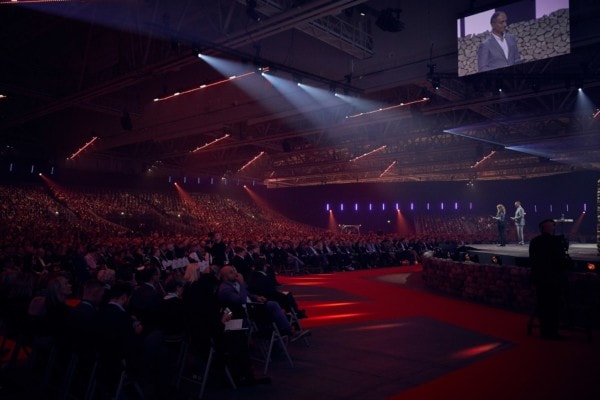5Aug2022
World economy, change, strategy, team, culture, and the list goes on. Business leaders face multiple simultaneous challenges on many fronts, but what are the most crucial things for leaders to focus on going forward?
We asked many of our Nordic Business Forum 2022 speakers what they think. So, here are 7 issues these top business experts highlighted:
Amy Edmondson: Think Long-Term
The overarching focus must be an appreciation for our deep interconnectedness and vulnerability on this small planet. What that means for leaders across industries is finding the courage to consider longer-term consequences of near-term actions – and to use that to alter those near-term actions. We need to focus on making the world work for everyone – and indeed this will take the kind of leadership that is too rarely seen. It may seem that my answer to this question quickly goes beyond the scope of my expertise, which is absolutely true. And yet, I believe the ability of leaders to focus on what matters most will require engaging people – at all levels, and with diverse expertise – in fearless, evidence-based journeys to discover the new solutions we need to thrive in the future.
Duncan Wardle: Be Human
If you ask the Artificial Intelligence experts what skill sets they believe will be the most important of the next decade, they will tell you “the ones that will be the hardest to program.” What would those be? They will tell you, “the ones that make us inherently human!” …And I will be sharing those during my talk. We must also challenge the paradigm of Profit over Purpose, because here comes Generation Z, who care far more about Purpose than Profit.
Jitske Kramer: Embrace Change
“The future is shaped in our daily actions and in the dreams and stories we all chase.”
The future is the domain of not knowing. The future is shaped in our daily actions and in the dreams and stories we all chase. It is up to leaders to give ground and direction to this future-shaping process. To guide their own uncertainty and anxiety and that of their people. To have the guts to stop dysfunctional systems and processes and to facilitate the creation of new ones. To put it in one sentence: to build strong tribes that are life-centered, connect with others where imaginable, fight for their purpose when necessary, heal when needed, and say goodbye if there is no other option.
Martin Lindstrom: Build a Purpose-Driven Culture
“Building an authentic purpose-driven culture is the key for employers to survive and thrive in this environment.”
The workplace has never been this accessible, and loyalty has never been this low. Remember: every employee is only a click away from a different job. Often they don’t even need to move. That independence has turned companies into disposable entities. An employee’s average tenure at a company has never been this short.
Building an authentic purpose-driven culture is the key for employers to survive and thrive in this environment. With the world in disarray (and a war taking place in everyone’s backyard), employees are asking some fundamental questions. The days of “business as usual” are long gone. This new reality demands highly nimble leaders who know how to take a stand, unite teams around shared purposes, and create movements. In short, tomorrow’s leader needs to know how to create and oversee an internal tribe.
Yesterday’s leaders never learned to be nimble, become tribe leaders, create a powerful purpose, and maintain a movement—yet these are fundamental to running a company today.
Petter Stordalen: Care about Your People
For me, building a good culture will always be important. I believe in people and diversity, and our business is about creating good experiences: A business FOR people, BY people. If you build a strong culture that values diversity, you have set yourself up for almost any challenge the future may hold. The pandemic may have changed the way we work and accelerated the digitalization, but we must never forget our most important resource—people and culture. Leaders who build trust and believe in their employees will have a much better chance at success going forward.
Rutger Bregman: Make a Difference
“Privileged people like those who attend the Nordic Business Forum are in a historically unprecedented position to do an enormous amount of good in the world.”
We are living through extraordinarily dangerous times. We all know about the existential risk of climate change of course, but on top of that comes the ever-present risk of a nuclear war, another (much more deadly) pandemic, and the development of artificial intelligence that may be misaligned with human values.
At the same time, privileged people like those who attend the Nordic Business Forum are in a historically unprecedented position to do an enormous amount of good in the world. We’ve made amazing progress in the fight against, for example, child mortality and extreme poverty, even though the world could do so much better. I think that’s the most important thing I would emphasize. You’re not part of the 99%, but globally speaking, you are the 1%. That places a big responsibility on your shoulders.
Zoe Chance: Change Your Focus
“In the medium term, we need to move beyond the market-based incentive systems that force the insatiable pursuit of short-term profits.”
In the near term, leaders can focus on employee engagement. Work is hard, life is stressful, and the permanent expansion of remote work means turnover will remain high. Unhappy employees make unhappy customers, and unhappy customers make unhappy shareholders. The profit gap between high-engagement companies and their low-engagement competitors, which Gallup calculates at 21%, will increase. (And remember engagement applies to leaders too—including you.) In the medium term, we need to move beyond the market-based incentive systems that force the insatiable pursuit of short-term profits. The fate of our planet depends on it.
Want to learn more from these bright business minds? You can by joining us in Helsinki (or online) for Nordic Business Forum 2022 on the 20th and 21st of September!

 by:
by: 
